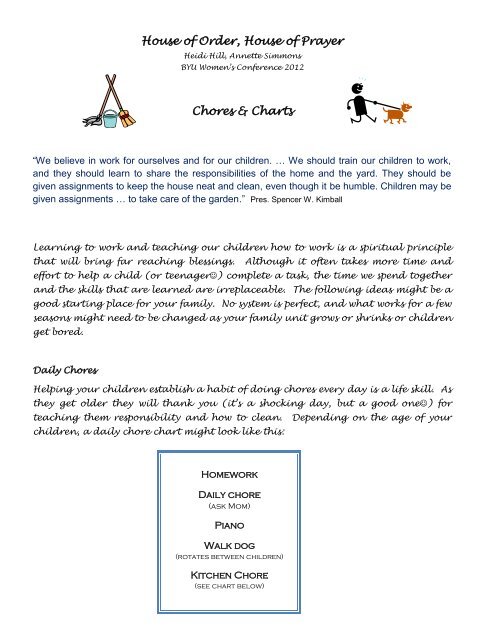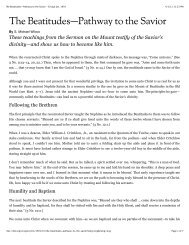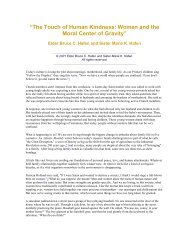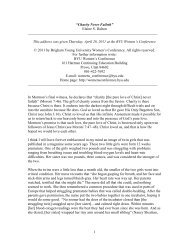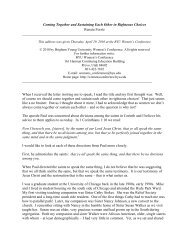House of Order, House of Prayer Chores & Charts
House of Order, House of Prayer Chores & Charts
House of Order, House of Prayer Chores & Charts
You also want an ePaper? Increase the reach of your titles
YUMPU automatically turns print PDFs into web optimized ePapers that Google loves.
<strong>House</strong> <strong>of</strong> <strong>Order</strong>, <strong>House</strong> <strong>of</strong> <strong>Prayer</strong><br />
Heidi Hill, Annette Simmons<br />
BYU Women’s Conference 2012<br />
<strong>Chores</strong> & <strong>Charts</strong><br />
“We believe in work for ourselves and for our children. … We should train our children to work,<br />
and they should learn to share the responsibilities <strong>of</strong> the home and the yard. They should be<br />
given assignments to keep the house neat and clean, even though it be humble. Children may be<br />
given assignments … to take care <strong>of</strong> the garden.” Pres. Spencer W. Kimball<br />
Learning to work and teaching our children how to work is a spiritual principle<br />
that will bring far reaching blessings. Although it <strong>of</strong>ten takes more time and<br />
effort to help a child (or teenager) complete a task, the time we spend together<br />
and the skills that are learned are irreplaceable. The following ideas might be a<br />
good starting place for your family. No system is perfect, and what works for a few<br />
seasons might need to be changed as your family unit grows or shrinks or children<br />
get bored.<br />
Daily <strong>Chores</strong><br />
Helping your children establish a habit <strong>of</strong> doing chores every day is a life skill. As<br />
they get older they will thank you (it’s a shocking day, but a good one) for<br />
teaching them responsibility and how to clean. Depending on the age <strong>of</strong> your<br />
children, a daily chore chart might look like this:<br />
Homework<br />
Daily chore<br />
(ask Mom)<br />
Piano<br />
Walk dog<br />
(rotates between children)<br />
Kitchen Chore<br />
(see chart below)
Each day my children help with a household chore (whatever needs the most<br />
attention and is the most help to me) and also help with a kitchen chore. Our<br />
rotating kitchen chore chart looks like this:<br />
There are many different chore chart systems. The truth is, you have to switch<br />
things up regularly because children get bored with any system. Here is an<br />
example <strong>of</strong> a system you could use:
The clipboard on the left is the parent’s clipboard. Each morning, pick a daily<br />
chore (square) that you would like completed by each child and put it on their<br />
clipboard (right clipboard – make one for each child).<br />
The rectangles are the dinner chores (set table, clear table, load dishes, sweep<br />
floor) that rotate among all family members weekly. If there are more people<br />
than dinner chores, there are free week assignments as well (those are<br />
everyone’s favorite).<br />
The large cards list what need to be done each day. On the child’s clipboard<br />
the Monday, Tuesday, Wednesday list is on one side and the Thursday, Friday,<br />
Saturday list is on the other side. Each day lists homework, chore, pick up room,<br />
or homework, walk dog, pick up room depending on the day.<br />
The important thing is to be FIRM, FAIR and CONSISTENT. I tie my children’s<br />
use <strong>of</strong> electronics / playing with friends to their completion <strong>of</strong> daily tasks. If<br />
their list isn’t done – no electronics or friends, period! 60 minutes <strong>of</strong> electronics<br />
on school days and 90 minutes on weekends, holidays and summer.<br />
As homemakers, we too should have a list that we complete each day. This is my<br />
list:
Weekly Focus Areas<br />
Even though we clean our home as a family each Saturday morning, there are<br />
areas that need specific, regular attention (and a homemaker’s touch). I’ve<br />
assigned these areas to a day <strong>of</strong> the week. In addition to my daily list (see<br />
above) I also check up on the following areas :<br />
Weekly <strong>Chores</strong><br />
In our home, Saturday morning is a guarded, family at home time. Unless it’s<br />
something super pressing, we don’t schedule things from 9-12 on Saturday<br />
mornings. Decide what works best for your family.<br />
I wrote up chore cards for everything around the house that needs to be<br />
cleaned. I’ve assigned points to each chore and then decided how many<br />
‘points’ each child needs to complete. As they get older, their contribution<br />
needs to be greater, so their required points reflects this. My children seem to<br />
appreciate that they have a choice in which chores they do (<strong>of</strong> course there are<br />
some household favorites which seem to always be chosen first). I’ve tried incentives<br />
for completing their Saturday chores by noon, but for our family I’ve found the<br />
best incentive is a consequence. Anyone not finished by noon gets to help clean<br />
out the family cars. Works like a charm. In addition to their chosen chores
they must also clean their rooms and shared bathroom each Saturday.<br />
Working with the person they share a bathroom with proves to be quite a<br />
relationship builder at times, but it’s teaching them ‘work with others’ skills,<br />
right?<br />
Weekly <strong>Chores</strong> could include:<br />
vacuum all carpets and rugs sweep or dust mop hard floors<br />
damp-mop floors dust furniture<br />
change beds spot clean handprints, etc.<br />
clean windows and mirrors sinks, showers / tubs, toilets<br />
dump all trash cans sweep porches / patios<br />
Advanced Lists<br />
If you’ve mastered your daily and weekly checklists, here is a list <strong>of</strong> common<br />
household cleaning to dos, each assigned to a timeline. This allows you to not<br />
only feel a sense <strong>of</strong> completion, but not worry when something needs to be done<br />
(i.e. it’s alright if there are cobwebs, I’m doing that next week).<br />
Monthly<br />
“Each one will find that happiness in this world mainly<br />
depends on the work he does, and the way in which he<br />
does it.” President Brigham Young<br />
Dust woodwork and high and low areas<br />
Catch all cobwebs<br />
Vacuum upholstery<br />
Vacuum drapes and blinds<br />
Vacuum carpet edges<br />
Damp-wipe seats <strong>of</strong> chairs<br />
Clean out refrigerator<br />
Clean kitchen cabinet fronts<br />
Clean appliance fronts and tops<br />
Dissolve any hard-water buildup<br />
Wash/disinfect trash containers<br />
Wash doormats
Sweep/hose walks and driveway<br />
Wash easy-to-reach windows<br />
Spot clean doors<br />
Sweep garage<br />
Change furnace filter<br />
Twice a Year<br />
Polish furniture<br />
Clean oven (at least)<br />
Defrost freezer<br />
Degrease stove hood/exhaust fan<br />
Turn mattresses<br />
Vacuum air and heat vents<br />
Dust tops <strong>of</strong> tall furniture<br />
Annually<br />
Wash or dry-sponge walls<br />
Touch up nicks in wall paint<br />
Clean under and behind things<br />
Wash hard-to-reach windows<br />
Wash or dry-clean drapes or curtains<br />
Wash window screens<br />
Clean light fixtures<br />
Wash blinds<br />
Wash/clean blankets<br />
Shampoo carpet/upholstery if needed<br />
Clean drain gutters<br />
Wash exterior <strong>of</strong> all windows<br />
Clean screens/storm doors<br />
Clean/sweep chimney every several years or so<br />
Wash or otherwise clean ceilings<br />
T<br />
Tip:<br />
Clean it<br />
when it’s<br />
soiled,<br />
not when<br />
it’s<br />
scheduled


